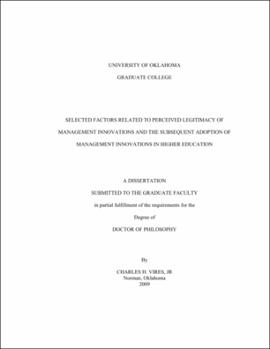| dc.contributor.advisor | Tan, David | |
| dc.creator | Vires, Jr., Charles H. | |
| dc.date.accessioned | 2019-05-01T17:22:34Z | |
| dc.date.available | 2019-05-01T17:22:34Z | |
| dc.date.issued | 2009 | |
| dc.identifier | 99109601902042 | |
| dc.identifier.uri | https://hdl.handle.net/11244/319396 | |
| dc.description.abstract | In 2001, Richard Birnbaum observed that management innovations, when introduced to higher education via the business sector, followed a lifecycle that led to rejection of the management innovation. The purpose of this study was to broaden our understanding of how characteristics that distinguish higher education from business organizations (power that is more dispersed; subsystems that are more loosely coupled; and organizational goals that are ambiguous) influenced perceived legitimacy and adoption of a management innovation within an institution of higher education. | |
| dc.description.abstract | Results of this sequential, explanatory mixed method study supported findings in five areas. First, the study substantiated Rogers' (1995) innovation adoption process. Second, the study substantiated that as perceived legitimacy of a management innovation increased individuals changed behaviors to align with that management innovation. Third, the study confirmed legitimacy increased when (1) outputs were defined, measurable, and linked to specific job descriptions; (2) the purpose of the management innovation was tightly coupled to the innovation's goal, the university's mission, the university's existing processes, individual goals, and individual motivation; and (3) administrators used referent or expert power. Fourth, the study indicated that the use of normative processes in developing and implementing innovations increased perceived coupling and decreased perceived ambiguity related to the management innovation and encouraged the use of referent and expert power. Finally, the study yielded results that were consistent with Birnbaum's (1998) suggestions for effective leadership within a cybernetic organization. Perhaps most important, the results of the study were incorporated into a practical model for policy makers and administrators. | |
| dc.format.extent | 429 pages | |
| dc.format.medium | application.pdf | |
| dc.language | en_US | |
| dc.relation.requires | Adobe Acrobat Reader | |
| dc.subject | Education, Higher--Management | |
| dc.subject | Diffusion of innovations | |
| dc.subject | Universities and colleges--Administration | |
| dc.subject | Merit pay--Case studies | |
| dc.title | SELECTED FACTORS RELATED TO PERCEIVED LEGITIMACY OF MANAGEMENT INNOVATIONS AND THE SUBSEQUENT ADOPTION OF MANAGEMENT INNOVATIONS IN HIGHER EDUCATION | |
| dc.type | text | |
| dc.type | document | |
| dc.thesis.degree | Ph.D. | |
| ou.group | Jeannine Rainbolt College of Education::Department of Educational Leadership and Policy Studies | |
